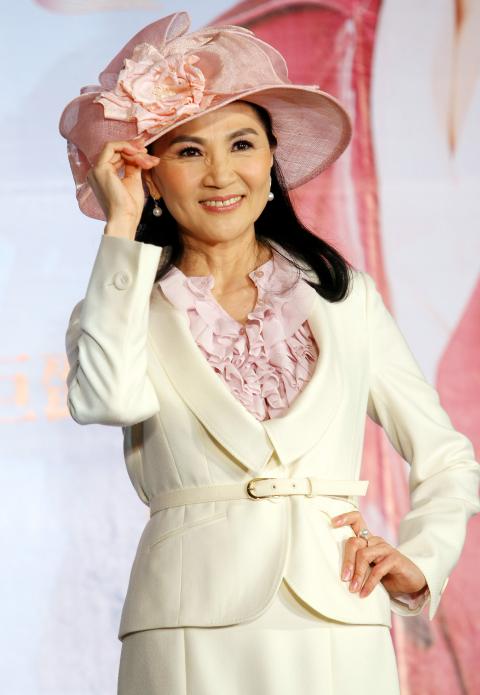Taiwanese pop diva Fong Fei-fei (鳳飛飛), whose legacy includes 81 albums and numerous popular singles, died of lung cancer in Hong Kong on Jan. 3, a representative confirmed yesterday. She was 58.
Lawyer Chiang Yen-wei (江燕偉) said the singer’s body has been cremated and the urn placed at a Fokuangshan-affiliated temple in Dasi Township (大溪), Taoyuan County, where Fong was born.
According to Fong’s official Web site, the singer had thanked her fans for supporting her throughout her career.

Photo: CNA
“I have lived a happy and wonderful life,” Fong said. “Thank you for being by my side all this time, my brothers and sisters. As for the songs I never got to sing in this life, I will sing them to you in my next life.”
The Web site said that Fong had insisted on personally signing birthday and New Year cards for fans, even during the last month of her life.
Chiang said Fong’s death had only been announced now because she wanted a low-key funeral.
“It [her death] happened at a time that was very close to the Lunar New Year holiday,” he said. “Fong was a very considerate person and wanted to keep everything low-key. She insisted that we not make an announcement until after the funeral was over. We hope fans will understand why we chose to handle the matter in this way.”
Chiang said that Fong canceled a concert in June last year after finding something wrong with her vocal cords.
After comprehensive examinations, she was diagnosed with lung cancer, which had already affected her vocal cords, he said.
Fong apologized to her fans for canceling the concert at the last minute, but said that doctors had recommended she rest for a year to recuperate.
Born Lin Chiu-luan (林秋鸞) in August 1953, Fong’s talent was first discovered at a singing contest in 1968.
Some of her popular songs include Wish You Happiness (祝妳幸福), I am a Cloud (我是一片雲), The Wild Goose on the Wing (雁兒在林梢) and When I Heard the Applause (掌聲響起).
Fong was known as the “Queen of Hats,” because she wore a different hat every time she performed.
Her unique voice and style made her a popular figure for other singers to imitate.
In addition to singing, Fong was also cast in several movies and TV dramas in the 1970s and 1980s and hosted a number of entertainment shows.
In 1980, she married Hong Kong businessman Zhao Hongqi (趙宏琦), who died of lung cancer in 2009 at the age of 70.

SECURITY: As China is ‘reshaping’ Hong Kong’s population, Taiwan must raise the eligibility threshold for applications from Hong Kongers, Chiu Chui-cheng said When Hong Kong and Macau citizens apply for residency in Taiwan, it would be under a new category that includes a “national security observation period,” Mainland Affairs Council (MAC) Minister Chiu Chui-cheng (邱垂正) said yesterday. President William Lai (賴清德) on March 13 announced 17 strategies to counter China’s aggression toward Taiwan, including incorporating national security considerations into the review process for residency applications from Hong Kong and Macau citizens. The situation in Hong Kong is constantly changing, Chiu said to media yesterday on the sidelines of the Taipei Technology Run hosted by the Taipei Neihu Technology Park Development Association. With

CARROT AND STICK: While unrelenting in its military threats, China attracted nearly 40,000 Taiwanese to over 400 business events last year Nearly 40,000 Taiwanese last year joined industry events in China, such as conferences and trade fairs, supported by the Chinese government, a study showed yesterday, as Beijing ramps up a charm offensive toward Taipei alongside military pressure. China has long taken a carrot-and-stick approach to Taiwan, threatening it with the prospect of military action while reaching out to those it believes are amenable to Beijing’s point of view. Taiwanese security officials are wary of what they see as Beijing’s influence campaigns to sway public opinion after Taipei and Beijing gradually resumed travel links halted by the COVID-19 pandemic, but the scale of

A US Marine Corps regiment equipped with Naval Strike Missiles (NSM) is set to participate in the upcoming Balikatan 25 exercise in the Luzon Strait, marking the system’s first-ever deployment in the Philippines. US and Philippine officials have separately confirmed that the Navy Marine Expeditionary Ship Interdiction System (NMESIS) — the mobile launch platform for the Naval Strike Missile — would take part in the joint exercise. The missiles are being deployed to “a strategic first island chain chokepoint” in the waters between Taiwan proper and the Philippines, US-based Naval News reported. “The Luzon Strait and Bashi Channel represent a critical access

Pope Francis is be laid to rest on Saturday after lying in state for three days in St Peter’s Basilica, where the faithful are expected to flock to pay their respects to history’s first Latin American pontiff. The cardinals met yesterday in the Vatican’s synod hall to chart the next steps before a conclave begins to choose Francis’ successor, as condolences poured in from around the world. According to current norms, the conclave must begin between May 5 and 10. The cardinals set the funeral for Saturday at 10am in St Peter’s Square, to be celebrated by the dean of the College